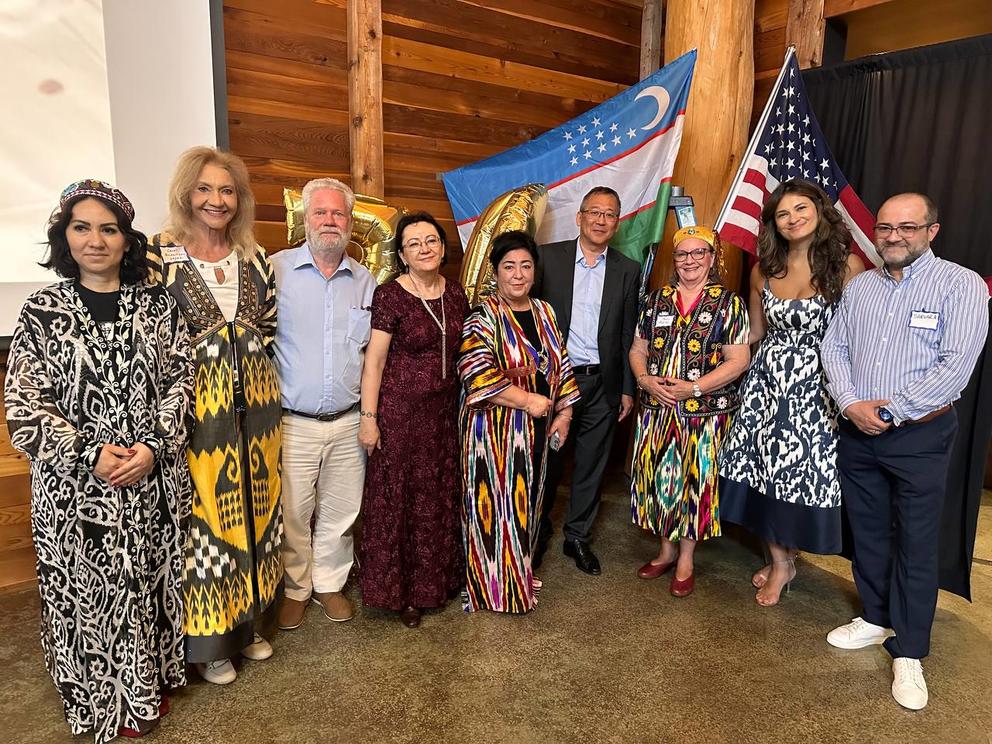Last week, a delegation from Seattle traveled to the Central Asian city to celebrate the 50th anniversary of the Seattle-Tashkent Sister City Association. This trip aligns with Uzbek Independence Day, Sept. 1, a celebration marked by concerts, military parades and a fireworks show in the evening in Tashkent’s Mustakillik Square.
From the beginning, the anti-war spirit has been a driving force for the Seattle/Tashkent bond, said Dan Peterson of Seattle, who recalls those concerns growing up during the Cold War.
“I remember my family being sent by our government plans for how to build a bomb shelter in our home, emphasizing we could survive a nuclear blast. Of course, that was not true,” said Peterson, co-president of the Association for seven years and a board member for several more. “It spurred us on who are older to work to reduce the possibility of a nuclear war with the Soviet Union.”
Though the Soviet Union is long gone, the Seattle/Tashkent relationship is still active. Last year an Uzbek agricultural scientist came to Seattle to discuss how the country has adapted to Soviet-era environmental damage and climate change, and hundreds of people in the Seattle area join the group’s annual celebration of Navruz, the Persian New Year on the spring equinox.
Lola Zakharova, who moved to Seattle from Tashkent in 2006 and was co-president of the Association from 2017 to 2018, said that the Uzbek community in Seattle sees the Association as their “connection with home.”
“This is an opportunity for them — especially people who feel homesick, but people who just want to maintain ties to their culture,” Zakharova said. “It’s always a very warm feeling in my heart after those delegations because it reminds me of home very much, and the people.”
Ilhom Miliyev, a linguist who lives in Tashkent and has been with the Association for 16 years, called it “one of the best parts of my life.”
“I’ve met many good people, realized many things, and now I really, really am a big supporter of this idea that people everywhere — in the U.S., in Uzbekistan, any country – are all same,” Miliyev said. “They have same wishes, fantasies, desires. There’s not any big great difference.”
Trouble on the ‘Left Coast’
The civil connection between Seattle and Tashkent was conceived by capitalist forces. In 1971, Alaska Airlines wanted to expand new routes into the Soviet Union, so it invited the mayors of three Soviet cities to its Seattle headquarters. Seattle Mayor Wes Uhlman met Tashkent Mayor Husnitdin Asamov at a dinner atop the Space Needle. Asamov didn’t speak English, but Uhlman spoke a bit of Russian from his time in the military.
“[Uhlman] became great drinking buddies with the mayor of Tashkent that had come on this propaganda trip,” said Fred Lundahl, who served the State Department in the U.S. Embassy in Tashkent from 1997 to 2001. “Over shots of vodka, they got to be best buddies and promised world peace, and said, ‘Hey, we ought to be sister cities.’”
Uhlman asked Richard Nixon’s State Department to authorize the relationship, but was promptly rejected. “The State Department said, ‘No, you can’t,’” Lundahl said. “‘It’s the Cold War. We don’t have sister-city relationships with them.’”
So Uhlman went to Washington Senator Warren Magnuson, chair of the Senate Commerce Committee, who threatened to use his influence to “screw up” the State Department budget if it didn’t authorize the sister-city bond.
“Supposedly this was the first mention of a very famous phrase,” said Lundahl, who has been with the Association since 2008. “Nixon, being busy with other things, sort of dismissively said to his Secretary of State, ‘Oh, what the heck. Let the ‘Left Coast’ do whatever it wants.’”
Alaska Airlines canceled its Seattle-to-Tashkent route just a couple years later due to underuse. But the sister-city bond was just getting started.
A continental bridge
“During the Cold War, it was very clear that what we wanted to do as a State Department – as a U.S. Government – was show off to the Soviets the best of America,” Lundahl said. “For the same reason, I’m sure, that’s what got Moscow to finally say, ‘Oh, what the heck. Let it go forward.’”
After the Seattle/Tashkent bond, other U.S./Soviet Union sister-city associations formed as well. Santa Fe, New Mexico, and Bukhara, Uzbekistan, are sister cities, as are Colorado Springs and Bishkek, Kyrgyzstan.
Greater understanding between nations was one goal of the Sister Cities International organization, which had been formed in 1956 by President Eisenhower. The organization became an independent nonprofit in 1967.
“[Eisenhower] was afraid of the military-industrial complex,” Peterson said. “One of the things he said in that conference in ’56 was we need to promote interactions among our peoples, to promote understanding and promote peaceful collaboration and coexistence and respect.”
Artist Jakob Schapiro and architect Leon Admov of Tashkent join fifth-grader Matthew Phillips in painting ceramic tiles at Seattle's Orca-Day Elementary School on February 29, 1988. The tiles, and about 10,000 others made mostly by Seattle schoolchildren, are now located in Tashkent at Friendship Park. (Jim Bates, MOHAI, Seattle Post-Intelligencer Photograph Collection)
The 1980s saw a flourishing of Seattle/Tashkent exchanges thanks in part to glasnost, Soviet President Mikhail Gorbachev’s policy of greater openness in government affairs and international relations.
In 1983, more than 14,000 people gathered in the old Kingdome for Target Seattle, a festival calling for the end of nuclear hostilities between the U.S. and the Soviet Union. Members of the organization traveled between Seattle and Tashkent to deliver petitions, signed by tens of thousands of people, expressing wishes for peace between the two empires.
Five years later in 1988, 175 volunteers traveled to Tashkent to help build Seattle Peace Park, within the larger Babur Recreation Park, bringing about 10,000 colorful four-inch ceramic tiles decorated mostly by Seattle elementary and middle schoolers. Its partner is Seattle’s modest Tashkent Park, one block northwest of the Seattle Public Library’s Capitol Hill branch. A plaque at the park commemorates the bond’s 25th anniversary in 1998 and dozens of ceramic tiles painted by schoolchildren border a concrete tree planter.
Volunteers from Seattle show off the completed Earth Mound, a mosaic of Earth as viewed from the North Pole, at Friendship Park (also known as Seattle-Tashkent Peace Park) within Babur Park in Tashkent, Uzbekistan, on September 7, 1988. (Kamal Buranon, MOHAI, Seattle Post-Intelligencer Photograph Collection)
Peterson says he has watched Uzbekistan mature substantially since it declared independence from the Soviet Union in 1991. “All of a sudden, imagine, your country’s formed,” he said. “You have no case law. You have no monetary system. You don’t even know your borders. It’s amazing how they have progressed so far.”
Modern developments
Since Russia began its war in Ukraine last year, Russian draft dodgers have fled to Uzbekistan and other Central Asian countries. While the government is officially neutral on the war, Zakharova said Uzbeks have been welcoming the Russians fleeing Putin’s regime.
“[Uzbeks] are very practical people too, and they’re embracing the economic opportunities brought by this major relocation,” Zakharova said.
Uzbekistan is considered a “largely authoritarian” country by human-rights observers. The previous president, strongman Islam Karimov, ruled for a brutal 25 years after the country declared independence from the Soviet Union until his death in 2016. Protests in the country’s autonomous Karakalpakstan region last year were met with state violence that killed at least 18 people. Gender inequalities and persecution of LGBTQ+ people also remain widespread, and forced labor and child labor continue in the country’s cotton industry – its largest agricultural export – despite some state efforts to curb these practices.
The country’s human-rights record has improved somewhat under President Shavkat Mirziyoyev, who took office in 2016 and has made efforts to open Uzbekistan to the world.
Last year Lola Zakharova traveled back to Uzbekistan with her adult son, her first trip since moving to the U.S. with her family in 2006, when her son was just 5. She went again with her whole family for the 50th-anniversary celebration.
“The fact that [my family] are going is a testament of a major change,” she said. “This was just a major, major breakthrough in comparison with what it was 10 years ago, 12 years ago, when it was virtually impossible to travel.”
Today, 32 years after Uzbekistan declared independence, it does not have as strong a relationship with the United States as it does with its largest trade partners, China, Russia, Turkey and Kazakhstan. Less than 1% of the country’s trade is with the U.S. Turkey and Iran moved to try to establish schools and reinforce historic and traditional ties in the newly independent country, though Iran found less success than Turkey.
China’s influence in the country is also sizable. Chinese capital and infrastructure projects have contributed to development in Uzbekistan since its independence; in recent years, China’s Belt and Road Initiative helped fund a major railway project. Last year, Uzbekistan voted against a United Nations motion to discuss China’s genocide of Uyghur Muslims in Xinjiang.
Association members believe this makes the Seattle/Tashkent link all the more important. At a time when U.S./Russia relations are degrading and the U.S. is actively escalating tensions with China, citizen diplomacy offers a path away from the deadly tribalism that, in the age of nuclear weapons, threatens the prospects of human life on Earth.
“We're not sitting there talking about international relations between our countries,” Peterson said. “As a sister city, we purposely avoid political stances to keep this relationship going – during the Cold War, and then when Uzbekistan became a sovereign nation. Things come up between our countries, and because we’re an independent group – all sister cities are – we can bypass those and look at how we can talk as people.”
The delegation in Tashkent also has some business to attend to. Seattle Peace Park in Tashkent has fallen into disrepair. In the past, the U.S. Embassy helped organize events like baseball games for people with disabilities and the planting of American trees in the park, but that’s dropped off in recent years, said linguist Miliyev.
“If you go to this park, you will see the big difference between Korean Park and Seattle Park. The Korean Park is so nice, so neat,” he said. “But since, what, four-five years, the embassy is not really interested in Seattle Park.”
The 50th-anniversary delegation will meet with the mayor’s office in Tashkent to discuss what can be done to help the park.
Peterson hopes the group’s message of peace connects with young people.
“A surprise for me has been that we have to work harder to engage our youth,” he said. “For me, that’s always in the back of my mind, that we really need to address these issues, so that there’s never a nuclear war. That motivates a lot of us who are older – the fear of war has been ever-present.”





